
The ComboMATCH precision medicine initiative is getting set to evaluate several new anti-cancer drug combinations
March 23, 2023
A closer look at ECOG-ACRIN’s men’s cancer trials
July 19, 2023Should I stay or should I go?

 Patients enrolled in cancer clinical trials may decide they want to stop treatment for any number of reasons: side effects, scheduling conflicts, financial stress, and more. However, many patients are unaware that stopping treatment does not automatically mean withdrawing from the trial. In fact, patients can stop treatment but remain in the study—and work with their care team to decide just how involved they want to be moving forward.
Patients enrolled in cancer clinical trials may decide they want to stop treatment for any number of reasons: side effects, scheduling conflicts, financial stress, and more. However, many patients are unaware that stopping treatment does not automatically mean withdrawing from the trial. In fact, patients can stop treatment but remain in the study—and work with their care team to decide just how involved they want to be moving forward.
Below, Naomi Haas, MD (pictured), a medical oncologist at the University of Pennsylvania Abramson Cancer Center, explains the difference between stopping treatment and withdrawing from a trial entirely. She also discusses some of the benefits and drawbacks of each choice.
What are the key differences between stopping treatment and withdrawing from a clinical trial?
When a patient withdraws entirely from a clinical trial—takes back the consent they provided when they first enrolled—the study team may no longer contact them for any follow-up. This can be a problem, because many studies track how long the participants live to see how well a new treatment works. Sometimes patients also ask that their data or samples (such as blood or tissue) be destroyed or omitted from analysis.
In contrast, when a patient stops treatment but remains in a clinical trial, the study team may still contact them for follow-up. The patient can decide if they want to attend all of their originally scheduled visits or just some of the appointments. The patient can also limit the number of times the study team may get in touch. Importantly, though, the patient allows the study team to keep their data and samples, which could help the study team to answer important questions that the trial is asking.
What sort of questions?
In general, the more data that are available, the more accurate the study will be. Samples are important, because collectively studying as many of them as possible may show a signal about why a drug is or is not working. For example, if only 20% of patients allow their samples to be analyzed, a study read as negative could miss that a proportion of patients with a particular molecular signal actually did better with a treatment. Samples can also reveal information that may help predict the risk of the cancer coming back (recurring) in certain patients, or which patients might benefit from more or less intense treatment. Imaging data is valuable because it can help lead to new technologies, such as artificial intelligence, that may transform cancer care in the future.
What are the benefits and drawbacks to staying in a clinical trial after stopping treatment compared to leaving and withdrawing consent?
A major benefit to staying in the trial, even if a patient stops treatment, is that their data will help the trial be as accurate as possible—and the results may help patients in the future. Some evidence also suggests that patients in clinical trials receive better care and closer follow-up than those who do not participate in clinical trials. These benefits may extend to patients who have stopped treatment but remain in a study.
Regarding drawbacks, patients who have stopped treatment could still experience inconveniences around scheduling or travel to whichever follow-up appointments they choose to attend. Patients will still need to budget for any missed work, travel costs, or medical costs their insurance does not cover. Finally, the study team will be in contact for follow-up, if on a limited basis, even if a patient has stopped treatment.
How can study teams help make sure patients are aware of their options once they decide to stop treatment?
Ideally, someone from the study team should sit down with the patient and talk them through their options: 1) stop treatment but remain in the trial, 2) stop treatment, leave the trial, but allow researchers to use their previously collected data, or 3) stop treatment, leave the trial, and ask for their data to be destroyed. In busy clinics, this conversation does not always happen—or does not always happen effectively. The informed consent document, another place where these options might be shared, only covers the issue briefly, in a sentence or two.
I think there is a place here for educational resources, like handouts or videos, which patients can share with family and friends as they consider their options. Yet those materials should not replace human interaction. They should supplement the conversation between the patient and their care team, so the patient can make an educated decision about their next steps.
Dr. Haas co-chairs the ECOG-ACRIN Genitourinary Committee, part of the Therapeutic Studies Program.

